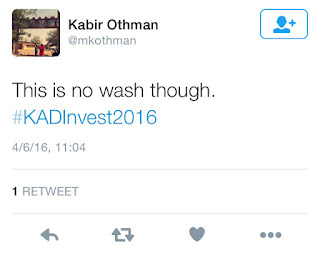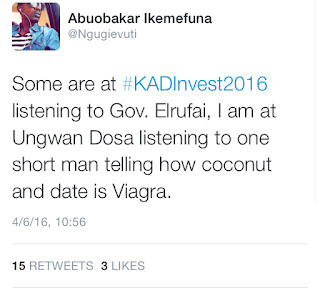A new technology hub is springing up in Kaduna. Great coders of Kaduna are rising and they are young, vibrant and fresh with ideas.
The first Kaduna Startup weekend, a forum for technoprenerus to connect with each other, mentors, get tools and be exposed to world of techie is trying to wake Kaduna up and move investors and innovators to find a newer and bubbling local startup ecosystem outside ofLagos and Abuja
Dream Home for Big Techs
From outside, CoLab lies flat in morning sun like a dull presence, in sync with other residential houses flanking it. Step a foot inside and it is a bowl of colours, wall art and techies. Energy radiating from white walls, reflecting on green, blue and yellow chairs, to maroon paintings onmurals and sofas decorated in Ankara fabrics. Kaduna’s first emerging co-working space and innovation hub for technology enthusiasts hosted Kaduna Startup Weekend.
Bankole Oloruntoba, co-founder of Network of Incubators and Innovators in Nigeria facilitated the idea-pitching session. Mr. Bankole on shaping Kaduna’s tech hub says: “People will not recognise Kaduna Tech Space unless you in Kaduna recognise it first.”
Sanusi Ismail founder of CoLab and an IT consutant who does most of his work in Lagos but lives in Kaduna, on what Kaduna provides that is different from Lagos and Abuja, he shrugs a shoulder and says “I was at Yaba, where CC Hub and other techs are located, and for a whole week, we only had light for 45 minutes. The rest of the days we were on generator. Throughout this program today, we have been on NEPA (public light provided by distribution companies).” He adds with visible scorn in his voice. “And that’s what Kaduna gives you. Cheap rent and almost free electricity.”
Ideas and Frameworks
Prototyping and presentation of frameworks session was moderated by Ahmed Mukoshy, CEO and founder of Gigalayer, a world-class web hosting business. Mohammed Ibrahim, director VoguePay, a user-friendly online payment processor described as Africa’s biggest payment processor, also collaborated to provide inputs during wire framework session.
Ideas were hustling and flying high. I was submerged in these sparks blinking bright, from an app to gather exclusive comedy skits and watch on the go; to connecting menial jobs, house helps and artisans to potential customers and homeowners; ideas on how to help small and menial job owners save money with dial of a code on a phone; to a school management system that will employ artificial intelligence to predict students performance and attitudes. Bold ideas and visions. Young minds clumped around tables discussing ideas and plotting algorithms. Imagining what Kaduna can do.
Silent Visibility
As these group of coders, developers and content creators numbering almost hundred, pitched ideas and prototyped, they were interrupted by an august visitor, the Executive Secretary of Kaduna State Investment and Promotion Agency (KADIPA) in his white kaftan and peddling glasses. Gambo Hamza, a jovial man, seemedto be in his fifties clearly in tune with technology and social media, and had tracked the event, without invitation, from publicity material spread on social media platforms.
Mr. Hamza’s visit was peculiar with absence ofhullabaloo and large entourages common with politicians in this country. He presented a gift parcel: “Mark Zuckerberg was in Lagos, we promise you within one year we will be bringing you Bill Gates”.
Kaduna State Government from a safe distance seemedto be involved with burgeoning techies, attracted by huge economic and job potentials of these startups, particularly to its increasing young population.
The problem though from developers’ angle is that state initiatives like Kaduna Startup & EntrepreneurshipProgram (KAD-STEP) from their scope of applications do not seem to cater for these budding technopreneurs, and rather concentrate more on traditional manufacturing, production and allied services. As such a huge pool of talented innovators do not get to access opportunities by state government.
But lack of government support is not the only fear and obstacle in the face of a number of these techies. Educational level and technological empowerment in Kaduna is far lower than that of Lagos and fears expressed of problem of community acceptance echoedaround during the facilitation workshop. Their kind are troubled daily, and labeled irresponsible.
“Most people don’t even know what we are doing. And when you talk of technology they only assume its limited to phones, TV and laptop.”
“Some will even tell you to stop wasting your time and go find a real job”.
Uneasy laughter to that statement spread across the room, but within the laughter was an overarching problem that radiated universally with all participants.
A Steve Jobs Reincarnation
Lights dimmed, walls became presentation screens, and in Steve Jobs-esque style, Aminu Bakori stepped forward into the light for the final workshop of the day. A techie storyteller wearing his enthusiasm for this latest innovation: CloudioraOS. Bakori, founder of FriendstieConcept, an innovative technology company in a blossoming presentation introduced CloudioraOS, a brand new operating system reimagined and built based on web technology. A cross platform that runs across various devices including smartphones, tablets, TVs and PCs and can be assessed remotely from any part of the world.
Coding Kaduna
It is dusk and drizzling as we leave CoLab. There is energy of technology buzzing. Kaduna has found a new rhythm. Unemployables, techies, software nerds, creators, designers, students. All this and stretching.Farmers, engineers, doctors, pharmacists, bankers, artists. Kaduna’s newest creations. Faces of technology, poster-children of Kaduna startups.
Life continues in Kaduna, people oblivious of giant brains in their spaces, coding, programming, developing, waiting, to burst out into an ecosystem. And in some room, laptop in front, eyes groggy, Aminu Bakori is fine-tuning his brand new Operating System, readying to storm the world through Kaduna. I will no doubt be watching, and so should you, to see how Kaduna will endure with this coding generation, and how the economy will shift and make a niche for their explosive brains and talents.














